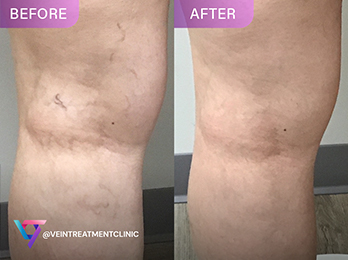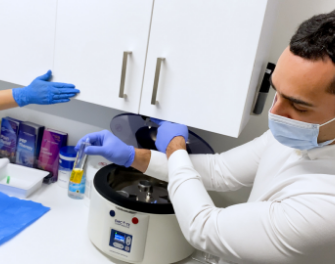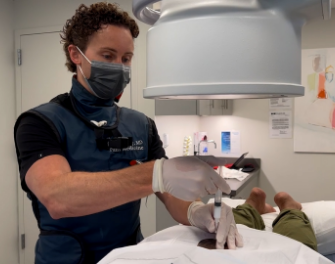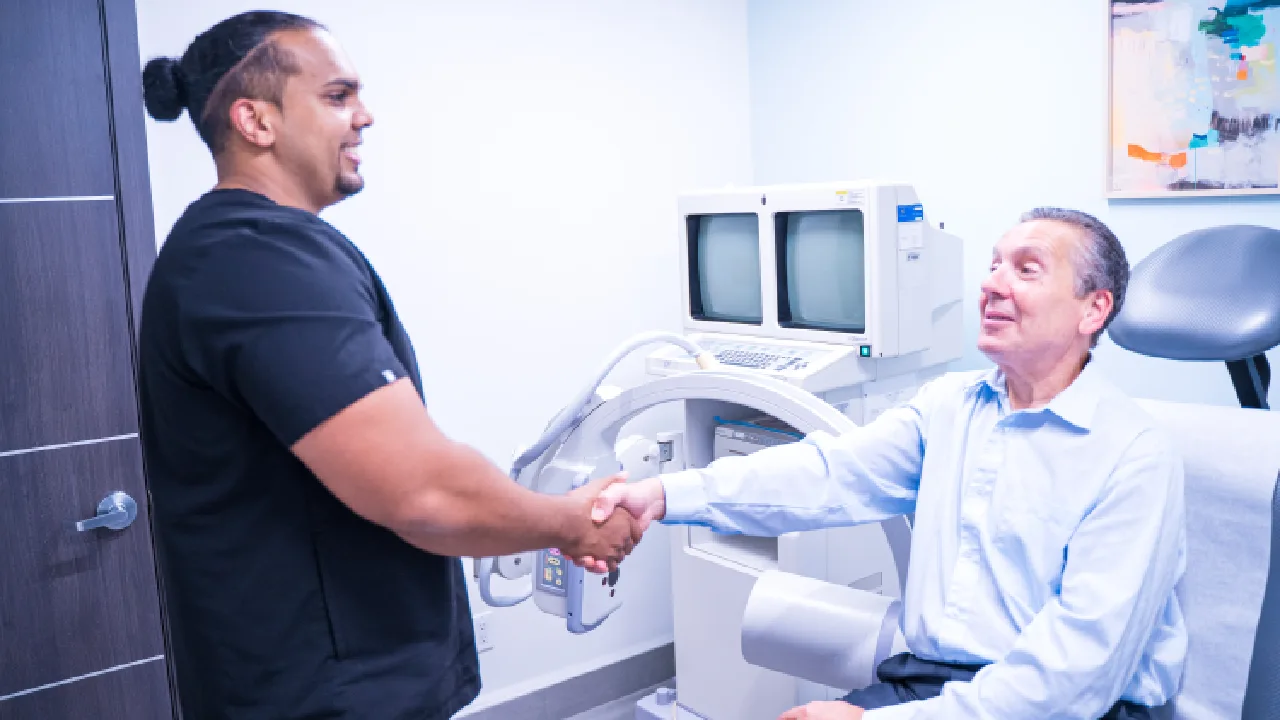
Navigating the Healthcare System for Pain Management
At Pain Treatment Specialists, we understand that dealing with chronic pain can be incredibly challenging, both physically and emotionally. As board-certified interventional pain specialists, we’re here to guide you through the intricate landscape of the healthcare system to ensure you receive the comprehensive pain management you deserve. In this detailed guide, we’ll explore various aspects of navigating the healthcare system for pain management, empowering you to make informed decisions about your health and well-being.
Are you interested in get more information about your condition or get a treatment?
Fill the form below to start!
But First, What Is Chronic Pain?
Chronic pain is a complex condition characterized by persistent discomfort lasting for more than three months. It can result from various underlying conditions such as arthritis, fibromyalgia, nerve damage, or injury. Chronic pain can significantly impact your quality of life, affecting your ability to perform daily activities, work, and engage in social interactions. It can also take a toll on your mental health, leading to feelings of frustration, depression, and anxiety.
Managing chronic pain requires a multidisciplinary approach tailored to each individual’s needs. Recognizing the multifaceted nature of chronic pain is essential for developing an effective treatment plan that addresses both the physical and emotional aspects of the condition.
Building Your Support Team
Navigating the healthcare system for pain management begins with assembling your support team. This team typically includes:
- Primary Care Physician (PCP): Your PCP is your first point of contact for managing your overall health. They can provide initial assessments, referrals to specialists, and coordination of care. Building a strong relationship with your PCP is essential for establishing a solid foundation for your pain management.
- Pain Specialist: A board-certified pain specialist, like us at Pain Treatment Specialists, has advanced training in diagnosing and treating various pain conditions. We offer a wide range of interventional procedures and techniques to effectively alleviate your pain. Our expertise enables us to develop personalized treatment plans tailored to your specific goals.
- Physical Therapist: Physical therapy plays a crucial role in restoring function, mobility, and strength. A skilled physical therapist can design personalized exercise programs to improve your quality of life and reduce pain. Working closely with a physical therapist can help you regain independence and achieve long-term relief from chronic pain.
- Psychologist or Psychiatrist: Chronic pain often takes a toll on mental health. Mental health professionals can offer counseling, cognitive-behavioral therapy (CBT), or medication management to address anxiety, depression, or other psychological factors contributing to your pain. Integrating psychological support into your treatment plan can help you develop coping strategies and enhance your overall well-being.
- Other Specialists: Depending on your condition, you may need to consult other specialists like orthopedists, neurologists, or rheumatologists. Collaborating with these experts allows for a comprehensive evaluation and ensures all aspects of your health are addressed.
Preparing for Your Appointment
Once you’ve identified your support team, the next step is to contact your chosen board-certified pain specialists. We’ll work with you to find a convenient time for your consultation. During your appointment, we’ll conduct a comprehensive evaluation, discuss your treatment options, and develop a personalized plan to address your pain and improve your quality of life. Preparing for your appointment with a pain specialist can help maximize its effectiveness.
- Gather Medical Records: Gather any relevant medical records, including imaging studies, laboratory results, and previous treatment summaries. This information provides valuable insights into your medical history and helps us tailor our approach to your specific needs. Be sure to bring copies of these records to your appointment for review.
- Keep a Symptom Journal: Keep a journal documenting your pain symptoms, including the location, intensity, duration, and any factors that worsen or alleviate your pain. This can help us better understand your condition and track changes over time. Be as detailed as possible, noting any trends or patterns you observe.
- List Medications: Make a list of all medications you’re currently taking, including prescription drugs, over-the-counter medications, supplements, and vitamins. Be sure to include the dosage and frequency of each medication. This information helps us assess your overall health and avoid potential drug interactions.
- Prepare Questions: Prepare a list of questions or concerns you’d like to discuss during your appointment. This ensures that we address all your inquiries and provide you with the information you need to make informed decisions about your care. Don’t hesitate to ask about your diagnosis, treatment options, potential risks and benefits, and expected outcomes.
Your Pain Management Options
During your consultation with a pain specialist, we’ll conduct a comprehensive evaluation to determine the underlying cause of your pain and develop a personalized treatment plan. Here are some common pain management options we may recommend:
- Medications: Depending on the nature of your pain, we may prescribe medications to alleviate discomfort and improve function. These may include nonsteroidal anti-inflammatory drugs (NSAIDs), muscle relaxants, or anticonvulsants. We’ll evaluate your medical history, symptoms, and treatment goals to select the most appropriate medication for you.
- Interventional Procedures: We specialize in a variety of minimally invasive procedures that target the source of your pain. These may include epidural steroid injections, nerve blocks, radiofrequency ablation, spinal cord stimulation, or joint injections. They are performed under fluoroscopic guidance to ensure accuracy and safety. We’ll discuss the potential benefits and risks of each procedure and answer any questions you may have.
- Physical Therapy: Physical therapy is an essential component of pain management, focusing on improving strength, flexibility, and mobility. Our physical therapists will design a customized exercise program tailored to your specific needs and goals. Through targeted exercises and manual techniques, physical therapy can help reduce pain and improve function.
- Alternative Therapies: In addition to traditional medical treatments, we may recommend complementary therapies such as acupuncture, chiropractic care, and massage therapy. These modalities can complement (but not replace) minimally invasive pain treatments.
At Pain Treatment Specialists, we believe in a collaborative care approach that emphasizes open communication and teamwork among providers. We work closely with your physicians and other specialists to ensure continuity of care and optimize treatment outcomes. Our goal is to empower you to take an active role in managing your pain and improving your quality of life.
During your treatment, we’ll maintain ongoing communication with your healthcare team to ensure that everyone is informed and involved in your care. This allows for a comprehensive evaluation, coordinated treatment planning, and integrated care delivery. By working together, we can address all aspects of your health and provide you with the support you need.
Navigating Insurance and Financial Considerations
Understanding your insurance coverage and financial responsibilities is an essential aspect of navigating the healthcare system for pain management. Here are some key considerations:
- Insurance Verification: Before any treatment, we’ll verify your insurance coverage and provide you with a detailed explanation of benefits. This includes information about copayments, deductibles, and any out-of-pocket expenses you may incur. Understanding your insurance coverage helps you budget for medical expenses and avoid unexpected costs.
- Prior Authorization: Some insurance plans require prior authorization for certain procedures or medications. We’ll help you obtain the necessary authorization from your insurance provider to ensure seamless access to care. Our team will handle the administrative process on your behalf, minimizing delays and ensuring timely approval for your treatment.
- Flexible Payment Options: We understand that managing healthcare costs can be challenging, especially for patients with chronic conditions. To accommodate your budget, we offer flexible payment options, including payment plans and financing arrangements. Our financial counselors can help you develop a personalized payment plan.
- Insurance Appeals: In the event that your insurance claim is denied, we’ll work with you to appeal the decision and advocate on your behalf. Our team has experience navigating the insurance appeals process and will do everything possible to ensure you receive the coverage you’re entitled to. We’ll provide supporting documentation, gather additional information as needed, and pursue all available avenues to overturn the denial and secure coverage.
Your Pain Management Experience
Navigating the healthcare system for pain management can feel daunting, but at Pain Treatment Specialists, we make your experience as seamless as possible. From your initial consultation to ongoing aftercare, we’re committed to providing personalized care that addresses your unique needs and goals. Here’s what you can expect throughout your pain management journey.
Initial Consultation & Diagnosis
Your pain management journey begins with an initial consultation with one of our board-certified pain specialists. During this evaluation, we’ll listen to your concerns, review your medical history, and conduct a thorough examination. We’ll ask detailed questions about your pain symptoms, including the location, intensity, duration, and factors that worsen or alleviate your pain. Based on this information, we’ll work collaboratively with you to establish an accurate diagnosis and develop a personalized treatment plan tailored to your specific condition and goals.
Personalized Treatment Plans
Once we’ve identified the underlying cause of your pain, we’ll develop a personalized treatment plan. We’ll discuss all available treatments with you, explaining the potential benefits, risks, and expected outcomes of each. Our approach to pain management is multidisciplinary, meaning we may recommend a variety of treatments to address different aspects of your condition. This may include medications to alleviate pain and inflammation, interventional procedures to target the source of your pain, and physical therapy to improve strength and mobility.
Minimally Invasive Pain Treatments
At Pain Treatment Specialists, we specialize in minimally invasive procedures that provide targeted pain relief with minimal discomfort and downtime. These procedures are performed using advanced imaging guidance to ensure precision and safety. Common minimally invasive pain treatments we offer include:
- Epidural Steroid Injections: Epidural steroid injections are a common treatment for managing back pain, leg pain, and neck pain caused by inflamed spinal nerves. During the procedure, a combination of corticosteroid medication and a local anesthetic is injected into the epidural space surrounding the affected nerve roots. This reduces inflammation and provides temporary pain relief, allowing patients to participate in physical therapy.
- Facet Joint Injections: Facet joint injections are used to alleviate pain and inflammation in the facet joints of the spine, which can occur due to arthritis, injury, or degenerative changes. During the procedure, a mixture of corticosteroid medication and a local anesthetic is injected directly into the affected facet joint under fluoroscopic guidance. This helps reduce pain and improve mobility, allowing patients to engage in activities of daily living with greater ease.
- Trigger Point Injections: Trigger point injections are a treatment option for relieving muscle pain and tension associated with myofascial pain syndrome. Trigger points are tight, knotted areas of muscle that can cause localized pain and referred pain in other areas of the body. During the procedure, a local anesthetic or corticosteroid medication is injected directly into the trigger point to alleviate pain and improve muscle function.
- Viscosupplementation: Viscosupplementation is a minimally invasive treatment for knee osteoarthritis. It involves injecting a thick gel-like substance called hyaluronic acid into the knee joint to provide lubrication and cushioning. This helps reduce friction and inflammation within the joint, thereby alleviating pain and improving mobility. Viscosupplementation is often recommended for patients who have not responded to conservative treatments.
- Nerve Blocks: Nerve blocks temporarily disrupt the transmission of pain signals along specific nerves or nerve clusters. They can provide relief from chronic pain conditions such as sciatica, neuropathy, and complex regional pain syndrome. Nerve blocks may involve the injection of local anesthetic, corticosteroid medication, or neurolytic agents directly into the affected nerve or nerve plexus, effectively blocking pain signals and providing pain relief.
- Radiofrequency Ablation: RFA is a minimally invasive procedure used to reduce or eliminate pain caused by dysfunctional nerves. Under fluoroscopic guidance, a special needle is inserted near the targeted nerve or nerve root. Radiofrequency energy is delivered through the needle to create heat, which destroys the nerve fibers responsible for transmitting pain signals. RFA can treat facet joint arthritis, sacroiliac joint dysfunction, or spinal stenosis.
- Spinal Cord Stimulation: Spinal cord stimulation (SCS) is a neuromodulation therapy that involves implanting a small device near the spinal cord to deliver electrical impulses to targeted nerve fibers. These impulses interfere with the transmission of pain signals to the brain, effectively reducing pain perception and improving function. SCS is often recommended for patients with chronic neuropathic pain conditions such as failed back surgery syndrome, complex regional pain syndrome, and neuropathy.
Recovery & Aftercare
After undergoing a minimally invasive pain treatment, we’ll provide you with detailed instructions for recovery. This may include recommendations for activity modification, pain management, and follow-up appointments to monitor your progress. Our team will be available to answer any questions or concerns you may have during your recovery period. We’ll provide guidance and support to help you navigate the healing process and ensure the best possible outcome.
Sustainable Lifestyle Changes
In addition to medical treatments and procedures, we’ll work with you to identify sustainable lifestyle changes that can support your long-term pain management goals. This may include recommendations for exercise, nutrition, stress management, sleep hygiene, and other self-care strategies. By incorporating these lifestyle changes into your daily routine, you can improve your overall health and well-being and reduce the impact of chronic pain on your life. Our team will provide the education, resources, and support you need to make these changes.
Advocating for Your Health
As you navigate the healthcare system for pain management, it’s essential to advocate for your health and well-being. Here are some tips for being an active participant in your care:
- Ask Questions: Don’t hesitate to ask questions or seek clarification about your diagnosis, treatment options, or insurance coverage. Knowledge is power, and the more informed you are, the better equipped you’ll be to make decisions about your health. Our team is here to provide you with the information and support you need to make informed decisions.
- Voice Your Concerns: If you’re experiencing pain or discomfort, communicate openly with your healthcare providers. Your feedback is valuable in guiding your treatment plan and ensuring that your needs are met. Whether you have questions about your symptoms, treatment options, or side effects, we’re here to listen and address your concerns.
- Follow Treatment Recommendations: Adhering to your treatment plan is crucial for optimal outcomes. Follow your healthcare provider’s recommendations regarding medications, exercise, therapy, and follow-up appointments. By actively participating in your treatment plan and following medical advice, you can maximize the effectiveness of your treatment.
- Stay Engaged: Stay engaged in your healthcare journey by attending appointments, participating in therapy sessions, and actively engaging in self-care activities. Your commitment to your health and well-being is instrumental in achieving long-term success. By taking an active role in managing your pain and prioritizing your health, you can regain control of your life and enjoy a higher quality of life.
Exploring Non-Medical Pain Management Strategies
In addition to medical treatments, several non-medical pain management strategies can complement your treatment plan. These strategies focus on lifestyle modifications, self-care techniques, and holistic approaches to promote pain relief and improve quality of life.
- Nutrition and Diet: A healthy diet plays a crucial role in managing chronic pain. Certain foods and nutrients have anti-inflammatory properties and can help reduce pain and inflammation. Focus on incorporating fruits, vegetables, whole grains, lean proteins, and healthy fats into your diet. Avoid processed foods, sugary snacks, and excessive caffeine, as these can exacerbate inflammation and contribute to pain.
- Exercise and Physical Activity: Regular exercise is essential for maintaining mobility, flexibility, and strength. Low-impact activities such as walking, swimming, yoga, and tai chi can help reduce pain, improve function, and enhance overall well-being. Aim for at least 30 minutes of moderate-intensity exercise most days of the week, and gradually increase duration and intensity as tolerated.
- Stress Management: Chronic pain is often accompanied by stress, which can exacerbate symptoms and interfere with healing. Practice stress-reduction techniques such as deep breathing, meditation, mindfulness, progressive muscle relaxation, or guided imagery. These techniques help promote relaxation, reduce muscle tension, and alleviate pain.
- Sleep Hygiene: Quality sleep is essential for pain management and overall health. Establish a regular sleep schedule, create a relaxing bedtime routine, and optimize your sleep environment for comfort and tranquility. Avoid caffeine, nicotine, and electronic devices before bedtime, as these can disrupt sleep patterns and worsen pain.
- Mind-Body Therapies: Mind-body therapies such as acupuncture, massage therapy, chiropractic care, and biofeedback can help reduce pain and improve physical and emotional well-being. These therapies focus on restoring balance, promoting relaxation, and enhancing the body’s natural healing mechanisms.
Pain Management FAQs
What should I expect during my first appointment with a pain specialist?
During your first appointment with a pain specialist, you can expect a comprehensive evaluation of your medical history, symptoms, and previous treatments. The pain specialist will conduct a physical examination and may order additional tests or imaging studies to further assess your condition. Be prepared to discuss your pain symptoms, treatment goals, and any questions or concerns you may have.
What types of treatments do pain specialists offer?
Pain specialists offer a wide range of treatments aimed at relieving pain and improving function. These may include medications, minimally invasive pain treatments, physical therapy, and complementary or alternative therapies. The specific treatment options recommended will depend on your individual needs, preferences, and underlying condition.
How long does it take to see results from pain management treatments?
The timeline for experiencing relief from pain management treatments varies depending on the type of treatment, severity of your condition, and individual response. Some treatments, such as medications or injections, may provide immediate relief, while others, such as physical therapy, may require time and consistent effort to achieve optimal results. Your pain specialist will discuss the expected timeline for each treatment and monitor your progress closely.
What can I do if my pain management treatment isn’t working?
If you’re not experiencing adequate relief from your pain management treatment, it’s essential to communicate openly with your pain doctor. Your pain specialist can adjust your treatment plan, explore alternative options, or refer you to other specialists as needed. It may take some trial and error to find the most effective treatment for your specific condition, so don’t hesitate to voice your concerns and collaborate with your healthcare team to find the best solution.
How can I manage my pain between appointments?
In addition to medical treatments, there are several self-care strategies you can incorporate into your daily routine to manage your pain between appointments. These may include staying active with gentle exercise, practicing relaxation techniques such as deep breathing or meditation, maintaining a healthy diet, getting adequate sleep, and avoiding activities or triggers that exacerbate your pain. Your pain specialist can provide personalized recommendations based on your individual needs and preferences.
What should I do if I have concerns about my insurance coverage or financial responsibilities?
If you have concerns about your insurance coverage or financial responsibilities, don’t hesitate to reach out to our clinic’s billing department or financial counselors for assistance. They can help you understand your insurance benefits, verify coverage for specific treatments, and explore flexible payment options or financial assistance programs if needed. Our goal is to ensure that you have access to the care you need without undue financial burden.
How can I communicate effectively with my healthcare providers?
Effective communication with your healthcare providers is essential for ensuring that your needs are met and that you receive the best possible care. Be open and honest about your symptoms, concerns, and treatment goals. Ask questions if you don’t understand something or need clarification. Keep a journal of your symptoms, medications, and any changes you notice between appointments. And don’t be afraid to advocate for yourself and speak up if you have questions or concerns about your treatment.
How do I know if I need to see a pain specialist?
You may consider seeing a pain specialist if you’ve been experiencing chronic pain that hasn’t responded to conservative treatments or if your pain is significantly impacting your quality of life. Common signs that indicate the need for a pain specialist include persistent pain lasting more than three to six months, difficulty performing daily activities, or reliance on pain medications.
What is the difference between acute and chronic pain?
Acute pain is typically short-term and results from tissue damage or injury, such as a sprained ankle or surgical procedure. It usually resolves once the underlying cause heals. In contrast, chronic pain persists for an extended period, often lasting months or years, and may not have an identifiable cause. It can significantly impact daily life and may require specialized treatment.
What are some red flags that indicate I should seek immediate medical attention for my pain?
While most cases of pain can be managed with conservative treatments, certain red flags may indicate a more serious underlying condition that requires immediate medical attention. These include sudden onset of severe pain, pain accompanied by fever, chills, or unexplained weight loss, pain that radiates down the arms or legs, or pain associated with numbness, weakness, or loss of bowel or bladder control.
What role does nutrition play in managing chronic pain?
Nutrition plays a crucial role in managing chronic pain, as certain foods and nutrients have anti-inflammatory properties and can help reduce pain and inflammation. A balanced diet rich in fruits, vegetables, whole grains, lean proteins, and healthy fats can support overall health and well-being. Avoiding processed foods, sugary snacks, and excessive caffeine can also help minimize inflammation and alleviate pain.
How can I cope with the emotional toll of chronic pain?
Coping with the emotional toll of chronic pain involves developing coping strategies, seeking support from loved ones or mental health professionals, and practicing self-care techniques to promote emotional well-being. These may include relaxation techniques, mindfulness meditation, engaging in enjoyable activities, maintaining social connections, and attending support groups or therapy sessions.
Contact Us for Seamless Pain Management
Navigating the healthcare system for pain management can be complex and overwhelming, but you don’t have to do it alone. At Pain Treatment Specialists, we’re here to guide you every step of the way, from the initial consultation to your comprehensive treatment and beyond. If you have any questions or concerns, don’t hesitate to reach out to us. We are committed to helping you control your pain and reclaim your life without relying on opioids or undergoing surgery.
FEATURED POSTS BY PAIN DOCTORS



















